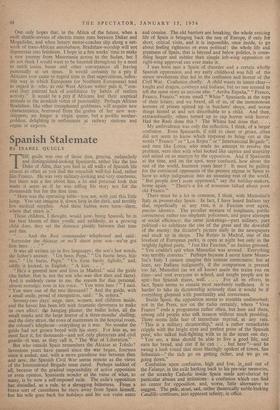T HE guide was one of those thin, greying, melancholy and
distinguished-looking Spaniards, rather like the late Duke of Alba, that you find in all walks of Spanish life almost as often as you find the roundish well-fed kind, rather like Franco. He was very military-looking and very courteous, but there was a fire about him, a lit and personal look that made it seem as if he was telling his story not for the thousandth but for the first time.
" Here was the operating table—you see, with just this little lamp. You can imagine it, down her in the dark, and terribly few medical supplies. And three babies were born—there, where that straw is."
Those children, I thought, would now, being Spanish, be in the best bloom of their youth; and suddenly, as a growing child does, they set the distance plainly between that time and this.
" . . . And the Red commander telephoned and said: ' Surrender the Alcazar or we'll shoot your son—we've got him here. . . .' " It was all written up in five languages: the son's last words, the father's answer. " Un beso, Papa," " Un fuerte beso, hijo mio," " Un bacio, Papa," " Un forte bacio, tigliolo," and, oddly it looked, in English: "A kiss. . . ." and cousins. The old barriers are breaking, the whole enticing life of Spain is bringing back the rest of Europe, if only for short, critical visits, and it is impossible, once inside, to go about feeling righteous or even political: the whole life and greatness of Spain, that is beyond and below politics, is some- thing larger and subtler than simple left-wing opposition or right-wing approval can ever make it.
I was born into a Spain of disorder and a certain wholly Spanish oppression, and my early childhood was full of the minor revolutions that led to the confusion and horror of the Civil War. Confusion chiefly. A child wants its issues clear— knight and dragon, cowboys and Indians; but no one seemed to tell the same story as anyone else. " Arriba Espana," " Franco, Franco, Franco," wrote small " White " Spaniards at the tops of their letters; and we heard, all of us, of the monotonous horrors of priests spitted up in butchers' shops, and worse things hinted at and not describable to a child. And then, extraordinarily, others turned up to cap horror with horror. Had the Reds done this ? The Whites had done that. . . .
My ambivalence was only the reflection, I think, of a larger -- confusion. Even Spaniards, if told to cheer or groan, often did not seem to know which response to bring out at the words " Franco " or " Los Rojos " or " International Brigade "; and men like Lorca, who made no attempt to resolve the problem, were shot with what looked like caprice and stupidity and seized on as martyrs by the opposition. And if Spaniards at the time, and on the spot, were confused, how about the rest of the world, fourteen years later ? It must be galling for the convinced opponents of the present regime in Spain to have to whip indignation into an unseeing rest of the world. " But people don't seem oppressed," say the holiday-makers, home again. " There's a lot of nonsense talked about poor old Franco."
There must be a lot in common, I think, with Mussolini's Italy in present-day Spain. In fact, I have heard Italians say that, superficially at any rate, it is Fascism over again, preciso identico. The peculiar mixture of toughness, public correctness; rather too emphatic policemen, and grave attempts at social efficiency; the same junketings—part military, part political—to celebrate the rise of the great and the downfall of the enemy; the dictator's picture daily in the newspapers and stuck up in shops. The Retiro in Madrid, one of the loveliest of European parks, is open at night but only in the brightly lighted parts. " Just like Fascism," an Italian groaned.
" You couldn't spit when Mussolini was around. Everything was terribly corretto." Perhaps because I never knew Musso- lini's Italy I cannot imagine this intense correctness; but at least, say Italians indignantly, if the comparison is pressed too far, Mussolini (as we all know) made the trains run on time—and sent everyone to school, and taught people not to spit—but Spanish trains, well. . . . For all its efforts, in fact, Spain seems to remain most resolutely inefficient. It is harder to take its dictatorship seriously than it would be if everything gleamed with punctuality and correctness. Inside Spain, the opposition seems to mumble undisturbed; not in the Press, nor on the radio certainly, where " Viva Franco " ends a programme rather often, but here and there, among odd people who talk treason without much prodding. There seems little fear of immediate reprisal, at any rate. " This is a military dictatorship," said a rather remarkable cripple with the bright eyes and perfect poise of the Spanish poor, who talked bull-fighting with us in the street one day. " You see, a man should be able to live a good life, and earn his bread, and rise if he can . . . but here "—and he swung a look round that most blazingly opulent of towns, San Sebastian—" the rich go on getting richer, and we go on going down." Confusion upon confusion, high and low, in„and out of the Falange, in the exile harking back to his pre-war memories, or the scratchy Catholic inside Spain made anti-clerical by particular abuses and irritations: a confusion which can find no centre for opposition, and, worse, little alternative to suggest. The pale, stout, sad, rather theatrically noble-looking Caudillo continues, into apparent infinity, in office.


































 Previous page
Previous page